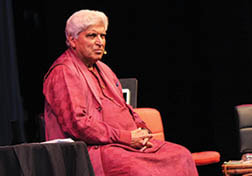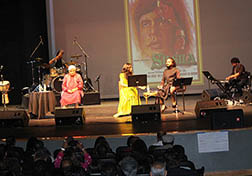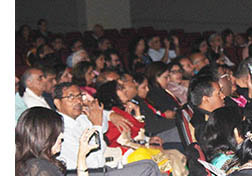
BY KALYANI VASAN
LAWNDALE, CA- If Houdini received “wows” for his magic tricks, Javed Akhtar received the silence of admiration, the nodding of heads and hundreds of, “Kya baat hai”. The Javed Akhtar evening called Main Koi Aisaa Geet Gaoon was presented by Five Dimensions Entertainment along with the sponsorship of US Bank.
LAWNDALE, CA- If Houdini received “wows” for his magic tricks, Javed Akhtar received the silence of admiration, the nodding of heads and hundreds of, “Kya baat hai”. The Javed Akhtar evening called Main Koi Aisaa Geet Gaoon was presented by Five Dimensions Entertainment along with the sponsorship of US Bank.
Held at the Centinela Valley Theater on Nov 4, the evening was defined by an audience that was largely non-millennial. Akhtar is defined by his script writing, lyrics and poetry.
Akhtar with his ever - smiling and gentle demeanor recited some of the most beautiful lyrics of Bollywood songs that he penned followed by their musical renderings by Parthiv Gohil and Janhvi Srimankar along with an amazing orchestra. Akhtar has been recognized with many awards in Bollywood such as the National Award for Best Lyricist-five times, Filmfare Award-16 times and countless others. However, it is the Padma Bhushan by the Government of India that is truly the icing on the cake.
Akhtar began his writing career as a screen dialog writer and continued to do so until he was approached by director/producer Yash Chopra to write lyrics for film songs as well. Hesitant at first, Akhtar made an attempt with Silsila which became a mega hit film but, also brought tremendous appreciation for his The success of the song ‘Dekha ek Khwab’ led to a string of hits, some of the most outstanding being Tum Ko Dekha to Yeh Khyal from Saath Saath featuring Deepthi Naval and the late Farooq Shaikh. At this point, Akhtar went on to say that people told him that his lyrics were poetry and only the high-brow intellectuals could appreciate them. But, then came along a request to write an item number for the film, Mr. India and he was given a few totally meaningless words to expand on and then add the lyrics to a song titled, “Hawa Hawaii”. He came up with the last word for the meaningless words needed literally by adding a label he saw on a shirt-Mombasa! ‘Hawa Hawaii” went on to create Bollywood history with the song sung by Kavitha Krishnamurthy and featuring Sridevi.
“Then came the dark ages of cinema music, with many years of songs that were just words strung together to tunes that did not reach your heart. Thankfully, this spell was broken with the film 1942: A Love Story, he said.” What followed was the golden age for Akhtar with a string of hits that spanned nearly two decades,-songs such as Mitwaa, Kal ho na Ho, Tauba Yeh Tumhare Ishare. However, it was what he referred to as the Anthem of an Extra Marital Affair: Kabhi Alvida Na Kehna. The film’s theme was very controversial and even taboo- two unhappily married people both married to other people fall in love with each other and to proceed with writing lyrics centered on their feelings was a tough task. ‘Mitwaa’ the song summed it all up. While the musical renderings by Janhvi and Parthiv were extraordinary, it was Akhtar’s poetical voice and the stories behind the songs, the stories of music directors, provided an insight into the inner workings of Bollywood that truly fascinated the audience. Another very outstanding feature was that there was a Question and Answer segment with Akhtar. The film Sholay’s dialogs were a top subject. Akhtar’s answer: “It was a great personal experience as well as growth for me; I had to write words for opposing characters such as a vibrant Basanti and a soulful silent mourner played by Jaya Baccchan. What is truly amazing is that people even now remember the character Sambha from the film vividly even though his dialogs were all of three words!” The evening seemed to have no ending in sight as medleys were sung, poetry was recited but once again, it was his insights not just of Bollywood at large but his own that struck a chord. “Current day Bollywood music is influenced by the need to portray only winners and hence there is a plethora of happy music. This is unnatural as what’s underneath never changes. Just as a swan seems to glide on the water, everything looks serene but, it is the thrashing of the swan’s legs under the surface that is symbolic of human emotions. Without feelings such as sorrow, anguish, restlessness and broken hearts life is not a life lived,” he philosophized. Akhtar dedicated the last medley to his children Farhan and Zoya and ended the show with a song from `Swadesh’ Yeh Jo Desh Hai Mera.
Akhtar with his ever - smiling and gentle demeanor recited some of the most beautiful lyrics of Bollywood songs that he penned followed by their musical renderings by Parthiv Gohil and Janhvi Srimankar along with an amazing orchestra. Akhtar has been recognized with many awards in Bollywood such as the National Award for Best Lyricist-five times, Filmfare Award-16 times and countless others. However, it is the Padma Bhushan by the Government of India that is truly the icing on the cake.
Akhtar began his writing career as a screen dialog writer and continued to do so until he was approached by director/producer Yash Chopra to write lyrics for film songs as well. Hesitant at first, Akhtar made an attempt with Silsila which became a mega hit film but, also brought tremendous appreciation for his The success of the song ‘Dekha ek Khwab’ led to a string of hits, some of the most outstanding being Tum Ko Dekha to Yeh Khyal from Saath Saath featuring Deepthi Naval and the late Farooq Shaikh. At this point, Akhtar went on to say that people told him that his lyrics were poetry and only the high-brow intellectuals could appreciate them. But, then came along a request to write an item number for the film, Mr. India and he was given a few totally meaningless words to expand on and then add the lyrics to a song titled, “Hawa Hawaii”. He came up with the last word for the meaningless words needed literally by adding a label he saw on a shirt-Mombasa! ‘Hawa Hawaii” went on to create Bollywood history with the song sung by Kavitha Krishnamurthy and featuring Sridevi.
“Then came the dark ages of cinema music, with many years of songs that were just words strung together to tunes that did not reach your heart. Thankfully, this spell was broken with the film 1942: A Love Story, he said.” What followed was the golden age for Akhtar with a string of hits that spanned nearly two decades,-songs such as Mitwaa, Kal ho na Ho, Tauba Yeh Tumhare Ishare. However, it was what he referred to as the Anthem of an Extra Marital Affair: Kabhi Alvida Na Kehna. The film’s theme was very controversial and even taboo- two unhappily married people both married to other people fall in love with each other and to proceed with writing lyrics centered on their feelings was a tough task. ‘Mitwaa’ the song summed it all up. While the musical renderings by Janhvi and Parthiv were extraordinary, it was Akhtar’s poetical voice and the stories behind the songs, the stories of music directors, provided an insight into the inner workings of Bollywood that truly fascinated the audience. Another very outstanding feature was that there was a Question and Answer segment with Akhtar. The film Sholay’s dialogs were a top subject. Akhtar’s answer: “It was a great personal experience as well as growth for me; I had to write words for opposing characters such as a vibrant Basanti and a soulful silent mourner played by Jaya Baccchan. What is truly amazing is that people even now remember the character Sambha from the film vividly even though his dialogs were all of three words!” The evening seemed to have no ending in sight as medleys were sung, poetry was recited but once again, it was his insights not just of Bollywood at large but his own that struck a chord. “Current day Bollywood music is influenced by the need to portray only winners and hence there is a plethora of happy music. This is unnatural as what’s underneath never changes. Just as a swan seems to glide on the water, everything looks serene but, it is the thrashing of the swan’s legs under the surface that is symbolic of human emotions. Without feelings such as sorrow, anguish, restlessness and broken hearts life is not a life lived,” he philosophized. Akhtar dedicated the last medley to his children Farhan and Zoya and ended the show with a song from `Swadesh’ Yeh Jo Desh Hai Mera.




 RSS Feed
RSS Feed
